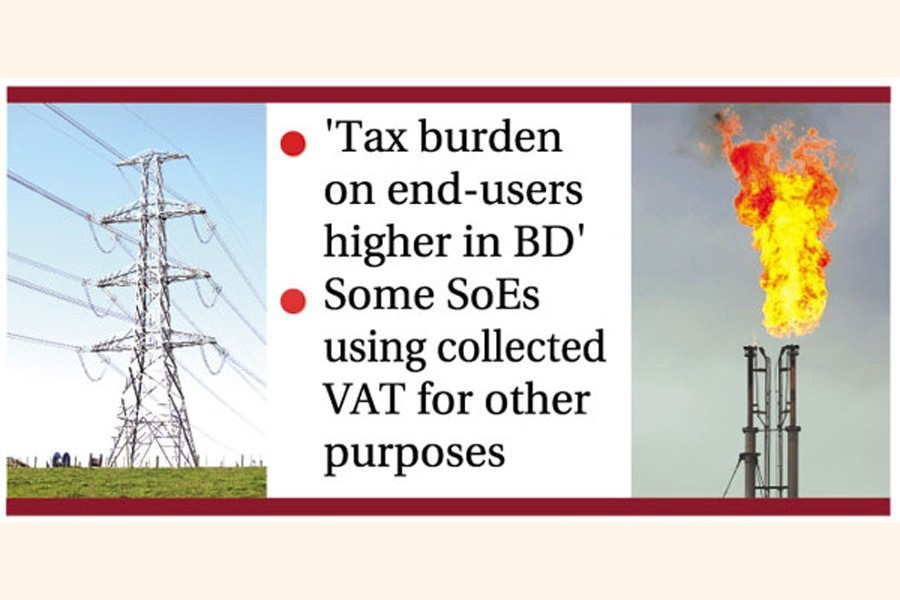Industrial and domestic consumers of two basic utility services - electricity and gas - paid Tk 315.35 billion taxes to the public exchequer with their consumption charges during the last five fiscal years (FY 2017-18 to FY 2021-22).
The amount is equivalent to the tax revenue collection by the National Board of Revenue (NBR) from all the domestic and import sources in a month.
Economists said tax burden on end-users is higher in Bangladesh, as the existing provisions have less refund or rebate facilities, imposing 'tax-on-tax' on consumers.
According to the NBR data of consumers' tax collection during the last five FYs, the gas consumers paid the major amount of the taxes, as Value Added Tax (VAT) rate was 15 per cent on them.
The gas consumers paid Tk 252.13 billion VAT to the five state-owned gas companies. Bangladesh Gas Field Ltd, Sylhet Gas Fields Ltd, BAPEX, Rupantarita Prakritik Gas Co Ltd, and Petrobangla deposited the consumers' VAT to the public exchequer.
Besides, four power distribution companies collected Tk 63.22 billion VAT at a rate of 5.0 per cent since FY 18 for the public exchequer, the FE analysis found.
Rural Electrification Board (REB), Dhaka Power Distribution Company (DPDC), Bangladesh Power Development Board (BPDB), and Dhaka Electric Supply Company (DESCO) deposited the VAT to the NBR.
VAT collection from the gas consumers grew by 129.52 per cent last year. The power consumers also paid 1.57 per cent higher VAT last year, compared to that of the previous FY.
Dr Ahsan H Mansur, Executive Director of the Policy Research Institute (PRI), said the VAT system is causing escalation of actual tax burden on the end-users.
There must be scopes to obtain VAT rebate, whether it is at uniform rate or not, except some cases - so that the consumers can enjoy the reduced rate.
Actual tax incidences sometimes increased to 35 per cent on the end-users, while 15 per cent is the highest rate of VAT in Bangladesh, he added.
A senior VAT official said they detected that some of the state-owned enterprises (SoEs), involved in providing utility services, are spending their collected VAT for other purposes, violating the VAT law.
Such trend has caused accumulation of a huge amount of arrear VAT lying with the SoEs.
"Consumers are paying VAT with their gas or electricity bills, but it is not properly deposited to the public exchequer in due time."
A huge amount of outstanding revenue with the SoEs is one the main reasons for missing the annual tax collection target, as the target is fixed by estimating collections from these sectors too, he added.
Farid Uddin, former member of the NBR, said tax should be imposed at equal rates to all, irrespective of poor and rich, as per principle of the VAT law. But a question remains whether the country's economic situation supports it or not.
VAT is a regressive tax, which is also slapped on numerous commodities, used by the low-income group of people too - considering the country's internal revenue mobilisation, he noted.
VAT on utility services is refundable or adjustable for the industrial consumers, which manufacture goods. However, the end-users have no option to get rebate on their paid VAT on utility services.
Four power distributing companies paid VAT worth Tk 9.78 billion in FY 18 that jumped by 48.77 per cent to Tk 14.55 billion in FY 22.
Rural power consumers under REB paid Tk 1.34 billion VAT last year. However, their VAT payment declined by 35.44 per cent compared to that of the previous year.
Electricity consumers in some parts of Dhaka city and Narayanganj under DPDC last year paid 10.09 per cent higher VAT worth Tk 4.85 billion, while those under BPDB paid Tk 5.86 billion.
Consumer of DESCO, supplying power in major parts of the capital city and Tongi, paid VAT worth Tk 2.71 billion last year.
Of the gas companies, VAT payment by RPGCL and BGFL declined by 37.05 per cent and 4.40 per cent respectively in last FY.
The five state-owned gas companies paid Tk 32.39 billion VAT last year against Tk 11.11 billion in FY 21.
However, VAT collection from the gas companies was not consistent during the last five years, as cash-strapped Petrobangla failed to deposit VAT regularly on several occasions.


